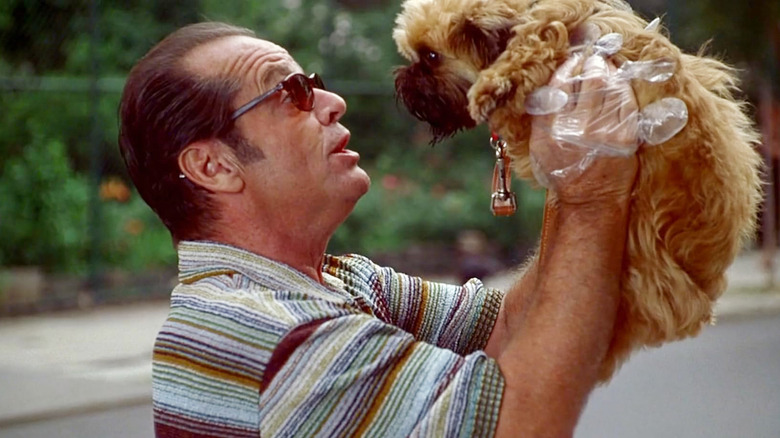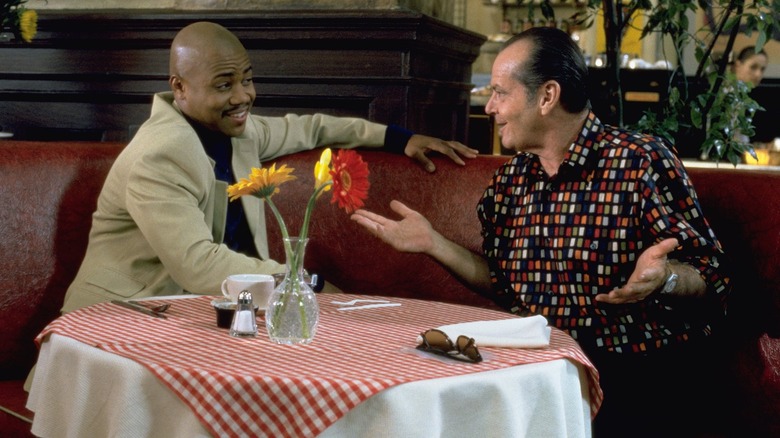As Good As It Gets' Director Put Jack Nicholson In A Frustrating Position
James L. Brooks' 1997 dramedy "As Good As It Gets" was a massive awards darling when it came out. The film is about an intensely misanthropic author named Melvin (Jack Nicholson) who is deeply afflicted with obsessive-compulsive disorder. When his neighbor, Simon (Greg Kinnear), is horrible assaulted by thieves, Melvin agrees to care for Verdell, Simon's dog. This is the first step in Melvin's very gradual opening up to warmer aspects of humanity. He's still a cruel a-hole, but by the end of the movie, he becomes a lovable a-hole. He is also redeemed by his relationship with a frustrated waitress named Carol (Helen Hunt), who hates him, and then hates that she sees the humanity in him.
"As Good As It Gets" was nominated for seven Academy Awards, including Best Picture, and won Oscars for Nicholson and Hunt's performances. It was considered a minor scandal in 1998 when Brooks was not nominated for Best Director. It was also a big hit, making over $314 million on a $50 million budget. There was a time when these kinds of Hollywood melodramas captured the attention of the mainstream.
In 2018, Brooks spoke with Entertainment Weekly about his long and prolific career, as well as his many Oscar nominations. (Brooks also won awards for 1983's "Terms of Endearment," was nominated for 1987's "Broadcast News," and he produced the Best Picture nominee "Jerry Maguire.") He talked specifically about a really, really rough day he and Nicholson had on the set of "As Good As It Gets," wherein the director and the actor, at great risk to their friendship, had to sit, argue, butt head, and fully unpack the character of Melvin.
Nicholson and Brooks struggled to 'get' Melvin
Brooks and Nicholson had been friends for many years when they made "As Good As It Gets," having previously worked together on "Terms of Endearment" (which won Nicholson an Academy Award for Best Supporting Actor). They were familiar with each other's mutual talents and, presumably, knew how to communicate on matters of character, story, and filmmaking. When it came to Melvin, however, Brooks and Nicholson seemingly couldn't "unlock" the character. He was a horrible misanthrope who insulted people at every opportunity, deliberately used bigoted language, and seemed to lack a filter when it came to his darker impulses. And yet, the character needed to be just lovable and/or funny enough for audiences to want his redemption.
Brooks and Nicholson apparently had constant conversations about Melvin and how he should be played. One day, when Melvin wasn't manifesting, Brooks resorted to some pretty extreme directorial means to make sure he and his lead actor were on the same page. In his own words:
"We needed our friendship. [...Melvin] was a characterization that was a needle to be threaded, [and] that was, at times, impossible to find. It was very frustrating for [Nicholson]. One of the most interesting days was raw and awful, and I did something I'll never do again: I sent the crew home at midday. It was Jack and I alone on this set, and I couldn't tell you one word we said to each other, but we sat there for three hours and the next day everything was okay."
It's a pity he can't remember the details of the conversation, but it seems that Brooks and Nicholson found what they were looking for. Melvin emerged as a character who was simultaneously likable and detestable, and Nicholson was excellent.
Brooks' next film, "Ella McCay," is due in theaters in 2025.

